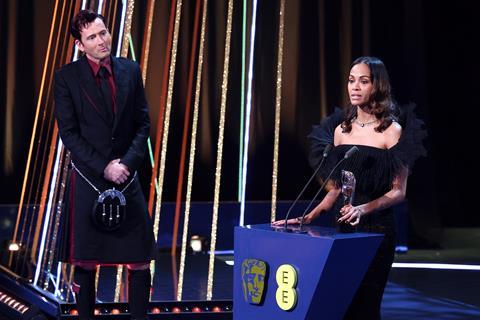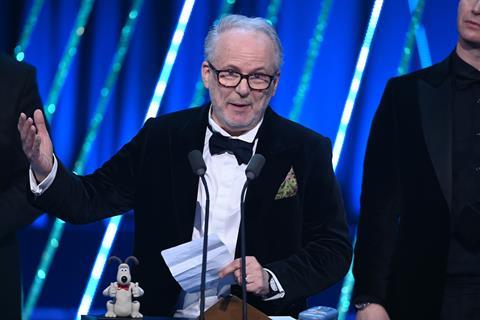Screen’s executive editor, reviews and new talent Fionnuala Halligan looks back at last night’s Bafta Film Awards.

It was suspenseful. Right up until the final moment, nobody in the audience knew how the Bafta best film award would land, and the fact the awards were so regularly portioned out during the evening increased the anticipation. For the first time since Three Billboards Outside Ebbing, Missouri in 2018, it went the same way as Bafta outstanding British film, to the Rome-set Conclave.
It wasn’t political. Conclave is set in the Vatican, but that doesn’t make it religious. It was a surprise when the settler documentary No Other Land failed to win in its category – Super/Man: The Christopher Reeve Story took that award. Organisers must have breathed a sigh of relief: with Israel/Palestine off the stage, it was up to Rich Peppiatt, outstanding British debut winner for Belfast’s Kneecap, to talk about language and culture in a decidedly non-incendiary manner given the up-yours film he directed.
It was deliberate escapism. You know something’s odd when the world is on fire and yet a fire in the swanky Chiltern Firehouse and the Netflix party having to move appeared on the international news pages. You got the feeling that the Karla Sofia Gascon/Emilia Perez fallout had left the room exhausted. They just wanted the showbiz equivalent of a quiet night in.
It wasn’t diverse. Bafta again had to rely on the Rising Star public vote to award its only British person of colour. Twenty years of Bafta Rising Stars and that award went to David Jonsson, a neat reminder of how much the public vote has gone to brilliant British Black talent over the years while Bafta has voted in other directions, despite interventions. Zoe Saldaña’s win for supporting actress for Emilia Perez, Paul Tazewell for Wicked’s costumes, and Samantha Quan, who shared the casting award with Sean Baker for Anora, were the only other people of colour to win out of 25 statuettes.

It was certainly British. Only Brits would get the greatness of David Tennant’s Proclaimers opening-number eccentricity or Take That’s red, helium-filled heart-shaped balloons and Legs & Co-style backing dancers (although, wait, does anyone understand that?). Prince William by video in a jumper and sports jacket. Two Baftas for Wallace & Gromit: Vengeance Most Fowl – nice and tidy. With Northern Ireland in the mix and Scotland inescapable throughout, it felt like a spread from Bristol’s Aardman to Peter Straughan’s best adapted screenplay win for the North. (Although Henry VIII would turn in his grave at all that Popery.)
It wasn’t femme friendly. Going into the night it already looked impossible that the directing section’s only female nominee, Coralie Fargeat, would win for The Substance. (And there were no female-directed films nominated for best film.) She didn’t, but neither did her star, Demi Moore, who both deftly skewered Hollywood’s twisted obsession with female ‘perfection’. Instead, the film industry’s love affair with the ‘imperfection’ of prostitutes continues, and it’s clearly not a bad way to win an Oscar – from Liz Taylor in Butterfield 8, to Jane Fonda’s Klute to Cabaret’s Sally Bowles (Liza Minnelli) and, now, Anora’s Bafta for Mikey Madison gives her wings for that ceremony in March.
It was funny, mostly: some presenters nailed the delivery of ambitious lines with more conviction than others. Simon Pegg’s resentment struck a seriously amusing note, and most of Tennant’s gags landed. As with last year, he’s clearly writing with a dad-joke-leaning team, and as every dad knows, you’ve got to punch those through with conviction. He’s the best host Bafta has had, and yes, that includes Stephen Fry, because he is a committed and talented performer who can also sing and dance, and his arched-brow delivery cuts through the celebrity love-in while still remaining affectionate.
It was stable when it came to attracting a TV audience, low for a Sunday night, down on Bafta’s historic highs, but continuing at an average of 3 million.
It was genuinely loving, not just luvving: see Jesse Eisenberg’s ode to his wife, and everything Warwick Davis said when accepting his Bafta Fellowship. (An antidote to thanking ‘Neon’ or ‘A24’ which comes across as especially odd when uttered by heads of departments.) There was nothing as ambitious as the speeches surrounding last year’s The Zone Of Interest, but the content of the films awarded, once No Other Land left the running, didn’t suggest them either.
The biggest love story of all, though, seems to be between Germany’s Edward Berger and Bafta, which threw seven awards at his All Quiet On The Western Front in 2023, and sent him home last night with the best film double for a total of four big awards (also adapted screenplay and editing), a tally shared with The Brutalist (directing, screenplay, actor and score). Like All Quiet, it’s not certain that Conclave’s success will be repeated at the Academy Awards, but in the hours before Oscar voting closes, it can’t hurt either.
As we left him clutching producer Tessa Ross’s hand throughout his speech, it seemed clear that he’s heading towards National Treasure status, or settled status, or however Britain best honours its adopted sons these days. Next up for him is Ballad Of A Small Player starring Colin Farrell and Tilda Swinton, another British film (producer, author, screenplay), set in Macao this time and in post. Will he make it a triple?






![The Brightest SunScreen[Courtesy HKIFF]](https://d1nslcd7m2225b.cloudfront.net/Pictures/274x183/3/5/0/1448350_thebrightestsunscreencourtesyhkiff_312678.jpg)


















No comments yet